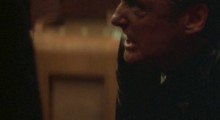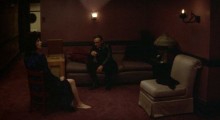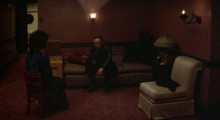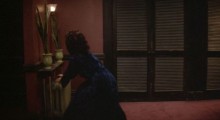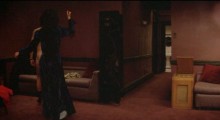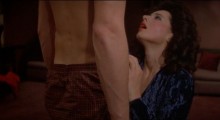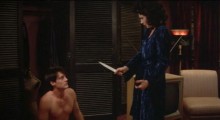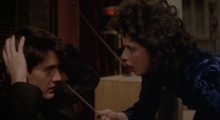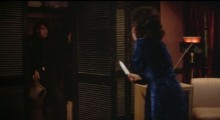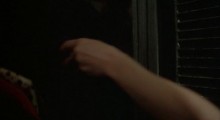The Blue Velvet Project
-
The Blue Velvet Project, #57

Second #2679, 44:39 The full and furious roar of Frank. The camera has just completed a somehow menacing lateral tracking shot passing very close behind Dorothy’s back. Frank, having deeply inhaled from the mask (as if to prepare himself for the performance that he—Dennis Hopper, not Frank—is about to deliver) is now contorted with fury and sorrow. And something else: terror. Terror, perhaps, for something he has summoned. Poem #259, stanzas two and three, from The Dream Songs, by John Berryman, goes like this: When worst it got, you went away I charge you and we will wonder over this […]
by Nicholas Rombes on Dec 21, 2011 -
The Blue Velvet Project, #56

Second #56, 43:52 The implied violence before the explicit violence, as the patterns and objects of Dorothy’s apartment have settled into a merciless, strict formalism. The fact of Dorothy’s bare leg, the tenderness of her foot upon the carpeting, sets a machine in motion somewhere. In his monumental, multi-volume work Rising Up and Rising Down, William T. Vollmann explains his reasons for exploring violence in such calculus-like detail: “I wanted to find a base point beneath which we couldn’t go—the ‘floor’ of evil. I could then note that the fall would not be bottomless. I might hit it and die […]
by Nicholas Rombes on Dec 19, 2011 -
The Blue Velvet Project, #55

Second #2585, 43:05 Frank has, as they say, arrived. And he is one suave motherfucker. Bourbon in hand, he commands the room. He is Sinatra minus the musical talent. He barks at Dorothy, as if he himself was the director of Blue Velvet: he orders her to light the set and arrange the props. Then he directs her in her performance, forcing her into a brutalizing form of Method acting. For Dorothy is clearly acting for Frank, in the same was that Isabella Rosselleni is acting for Lynch, and for us. Her apartment suddenly has been transformed—with the entrance of […]
by Nicholas Rombes on Dec 16, 2011 -
The Blue Velvet Project, #54

Second #2538, 42:18 Frank has arrived, banging on the door. The fact that we anticipated his arrival makes it no less terrifying. Jeffrey—naked—has been shuttled into the closet, while Dorothy ditches the knife behind the radiator, in one of Blue Velvet’s many sly, tension-breaking references to Eraserhead. In Art and Fear, Paul Virilio reminds us that the coming of sound in film in the late 1920s effectively transformed silence into something alien, almost a special effect: Yet one crucial aspect of this mutation of the seventh art has been too long ignored and that is the arrival of the talkies. […]
by Nicholas Rombes on Dec 14, 2011 -
The Blue Velvet Project, #53

Second #2491, 41:31 “Get over there on that couch,” Dorothy says, and then follows Jeffrey (naked except for his black socks), knife raised, as if she would plunge it into his back were he to hesitate. The frame practically vibrates in anticipation of the coming of some dark force against which this tableau is nothing but a pale rehearsal. In Cinema 1: The Movement-Image, Gilles Deleuze writes that the frame is related to an angle of framing. This is because the closed set is itself an optical system which refers to a point of view on the set of parts. […]
by Nicholas Rombes on Dec 12, 2011 -
The Blue Velvet Project, #52

Second #2444, 40:44 The still frame, so much like a photograph that it takes a violent deformation of reality to make it move. Jeffrey and Dorothy, frozen eternally in a film that has stuttered to a stop. In John Ashbery’s long poem Girls on the Run, there are these lines: I’ll go you one better, Fred chimed in, here’s a diver, let’s call her Josephine, who dives and dives, further and downward, all our lives’ span, to the basis of that bridge. Dorothy and Jeffrey have taken the dive that trembles us into fear, and prevents us from following. So […]
by Nicholas Rombes on Dec 9, 2011 -
The Blue Velvet Project, #51

Second #51, 39:57 What is this world? Like piecing together a puzzle over an abyss, we are witnessing the scene of a crime conveyed in secret code. We know, of course, that Dorothy will not kill Jeffrey, but somehow this fact only makes matters worse. The murderers and the murdered. In her never-out-of-date book Window Shopping: Cinema and the Postmodern, Anne Friedberg writes that as soon as the photographic negative made possible a standardized image, photography and then cinematography made possible the seeing of exactly the same image(s) over time. Film experiences had an unprecedented repeatability. . . This notion […]
by Nicholas Rombes on Dec 7, 2011 -
The Blue Velvet Project, #50

Second #2350, 39:10 1. Dorothy, the knife dangerously close to Jeffrey’s nose, perhaps unintentionally recalling the infamous nose-slicing moment in Roman Polanski’s Chinatown. 2. Has Jeffrey caused her to act like this, or has Frank? Jeffrey is not Frank, although Dorothy treats him like she might were she to find him hiding, unarmed, in her closet. 3. In the fevered dream of Blue Velvet, what causes what is impossible to untangle, as if concepts like “before” and “after” don’t mean a thing. 4. In Steve Erickson’s novel Zeroville, Vikar—who becomes an editor not just of film but of a version […]
by Nicholas Rombes on Dec 5, 2011 -
The Blue Velvet Project, #49

Second #2303, 38:23 In Roberto Bolaño newly published story “The Colonel’s Son,” the narrator describes a zombie movie he’s recently seen on TV. In fact, the entire story is a sordid summary of the movie, introduced like this: I swear it was the most democratic, the most revolutionary film I’d seen in ages, and I don’t say that because the film in itself revolutionized anything; not at all, it was pathetic really, full of clichés and tired devices, yet every frame was infused with and gave off a revolutionary atmosphere . . . At the moment of this frame, second […]
by Nicholas Rombes on Dec 2, 2011 -
The Blue Velvet Project, #48

Second #2256, 37:36 When not to look? A fragment: Dorothy’s arm, reaching into the closet where Jeffrey hides, to fetch the blue velvet gown in preparation for Frank’s arrival. A confession: I’ve never watched—completely watched—this upcoming section of the film, out of sheer fear of what I can hear unfolding on the screen. Or if I have watched it, I have done so using the Travis Bickle method. What is it that we need to protect ourselves from in the most brutal moments of Blue Velvet? In an interview with the writer Ben Marcus, Brian Evenson said that to render […]
by Nicholas Rombes on Nov 30, 2011
